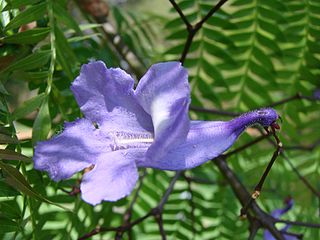
Jacaranda is a genus of 49 species of flowering plants in the family Bignoniaceae, native to tropical and subtropical regions of the Americas. The generic name is also used as the common name.

Stachys is a genus of plants, one of the largest in the mint family Lamiaceae. Estimates of the number of species vary from about 300, to about 450. Stachys is in the subfamily Lamioideae and its type species is Stachys sylvatica. The precise extent of the genus and its relationship to other genera in the subfamily are poorly known.

Sobralia is a genus of orchids native to Mexico, Central and South America. The plants are more commonly terrestrial, but are also found growing epiphytically, in wet forests from sea level to about 8,800 ft. The genus was named for Dr. Francisco Sobral, a Spanish botanist. The genus is abbreviated Sob in trade journals.

Exochorda is a small genus of flowering plants in the family Rosaceae, native to China and central Asia (Turkestan). They are used as ornamental plants with the common name pearl bush, or pearlbush. Numerous species have been described on the basis of differing appearance and geographical separation, but a systematic study revealed that the different types are closely related and probably all descended from a single species that formerly had a wide distribution that has been fragmented by habitat loss. As a single species the correct name is E. racemosa.
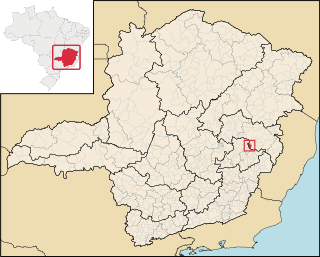
Sobrália is a municipality in Brazil in the state of Minas Gerais. Its population in 2020 was estimated to be 5,514 inhabitants. The name Sobrália came from a local Native American tribe referring to the flowers called sobralia.
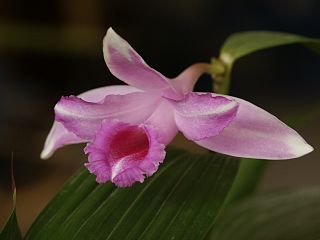
Sobralia decora, commonly known as the beautiful sobralia, is a species of orchid. It is pink-lavender and is found from Mexico through Central America. It is kept by orchid fanciers.

Volcán Chingo is a stratovolcano on the border between Guatemala and El Salvador. The largest point on the Guatemala/ El Salvador border is Volcán Chingo at 5,823 feet. It is also known to be the second highest of a group of volcanoes in the SE Guatemala region. The population of people living within 30 km of the Volcán Chingo is estimated to be around 867,678 people. There are no historical eruptions documented for this volcano but it is currently active. The exact volcano number when trying to locate it in the Smithsonian website is 342170.

Dombeya is a flowering plant genus. Traditionally included in the family Sterculiaceae, it is included in the expanded Malvaceae in the APG and most subsequent systematics. These plants are known by a number of vernacular names which sometimes, misleadingly, allude to the superficial similarity of flowering Dombeya to pears or hydrangeas. Therefore, the genus as a whole is often simply called dombeyas. The generic name commemorates Joseph Dombey (1742–1794), a French botanist and explorer in South America, involved in the notorious "Dombey affair", embroiling scientists and governments of France, Spain, and Britain for more than two years.

Anaxagorea is a genus of flowering plants in the subfamily Anaxagoreoideae in the family Annonaceae. There are about 26 species, distributed in Central and South America.

Sarah Anne Drake (1803–1857) was an English botanical illustrator who worked for John Lindley and collaborated with Augusta Innes Withers, Nathaniel Wallich and others.
Calaway Homer Dodson was an American botanist, orchidologist, and taxonomist.
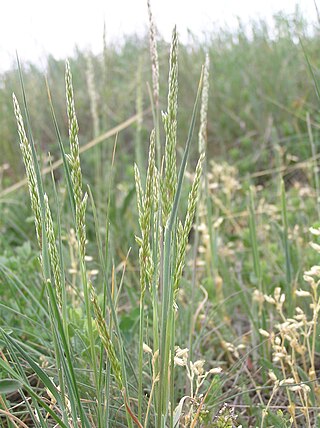
Koeleria macrantha is a species of grass known by the common name prairie Junegrass in North America and crested hair-grass in the UK. It is widespread across much of Eurasia and North America. It occurs in many habitat types, especially prairie.

Chaenactis macrantha is a species of flowering plant in the daisy family known by the common names bighead dustymaiden and Mojave pincushion. It is native to the Great Basin and the southwestern deserts of the United States, in California, Arizona, Utah, Nevada, southwestern Idaho, and southeastern Oregon. It grows in dry, open habitat with gravelly, sandy soils, often calcareous or alkaline in nature.

Sobralia dichotoma, is a species of orchid native to Colombia, Ecuador, Peru and Bolivia.

Sobralia fragrans, commonly known as the fragrant sobralia, is a species of orchid found from Mexico to tropical South America.

Sobralia macrophylla, commonly known as the large-leafed sobralia, is a species of orchid found from Central America to tropical South America.
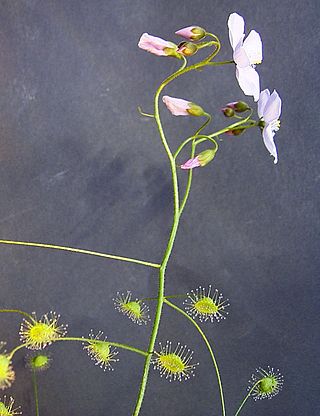
Drosera macrantha, the bridal rainbow, is a scrambling or climbing perennial tuberous species in the carnivorous plant genus Drosera that is endemic to Western Australia. It grows in a variety of habitats, including winter-wet depressions in sandy, loamy, laterite, or quartzite soils. D. macrantha produces small, cup-shaped carnivorous leaves along a long stem that can be 0.16–1.5 m (0.5–4.9 ft) high as it climbs. Its 1 in (2.5 cm) white or pink flowers emerge from June to November, blooming earlier in the more northern range.

Drosera stricticaulis, the erect sundew, is an erect perennial tuberous species in the carnivorous plant genus Drosera. It is endemic to Western Australia and is found near watercourses and granite outcrops in sandy clay or loam. D. stricticaulis produces small, cup-shaped carnivorous leaves along green, glandular stems that can be 25 cm (10 in) high. Pink flowers bloom from July to October.

Drosera sect. Ergaleium is a section of 26 species that are erect or scrambling tuberous plants in the genus Drosera. This section represents a natural group and are taxonomically monophyletic.
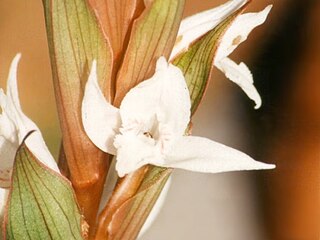
Pteroglossa is a genus of flowering plants from the orchid family, Orchidaceae. It is native to South America, Central America, and Mexico.
- Pteroglossa euphlebia(Rchb.f.) Garay - Rio de Janeiro
- Pteroglossa glazioviana(Cogn.) Garay - Brazil, Paraguay
- Pteroglossa hilariana(Cogn.) Garay - Brazil
- Pteroglossa lurida(M.N.Correa) Garay - Brazil, Paraguay, Argentina
- Pteroglossa luteolaGaray - Argentina
- Pteroglossa macrantha(Rchb.f.) Schltr. - Brazil, Paraguay, Venezuela
- Pteroglossa magnificaSzlach. - Paraguay
- Pteroglossa regia(Kraenzl.) Schltr. - Argentina
- Pteroglossa rhombipetalaGaray - Paraguay, Argentina
- Pteroglossa roseoalba(Rchb.f.) Salazar & M.W.Chase - widespread from Oaxaca to Argentina



















